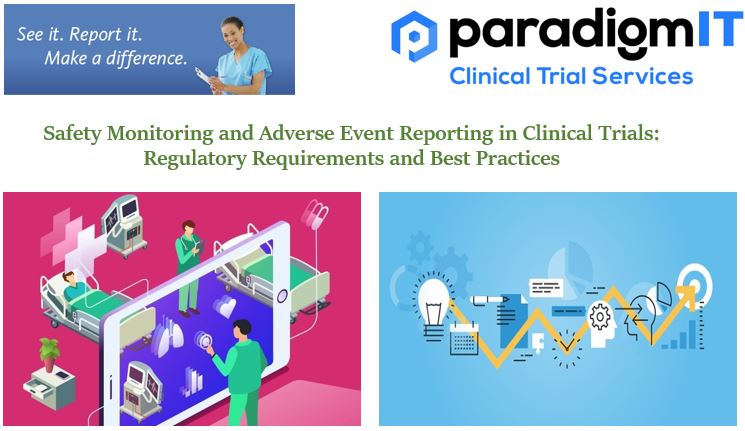Clinical trials must include safety monitoring and adverse event reporting because they guarantee the health and safety of research participants. Depending on the nation and location, there are different regulatory criteria and best practices for safety monitoring and adverse event reporting, but they all typically work to ensure that clinical trials are run morally and safely. However, a few typical regulations are as follows:
Regulatory Requirements:
- International Council for Harmonization of Technical Requirements for Pharmaceuticals for Human Use (ICH): The ICH provides guidelines that are widely accepted globally. The ICH E6(R2) guideline on Good Clinical Practice (GCP) outlines the standards for safety monitoring, reporting, and management of adverse events.
- Institutional Review Boards/Ethics Committees (IRBs/ECs): Local ethics committees or IRBs oversee and approve clinical trials to ensure participant safety. They review safety monitoring plans and adverse event reporting procedures.
- Regulatory Authorities: Regulatory agencies such as the U.S. Food and Drug Administration (FDA), the European Medicines Agency (EMA), and other national regulatory bodies have specific requirements for safety monitoring and reporting. Sponsors must comply with these requirements and submit safety reports to the regulatory authorities.
- Trial Protocol: The clinical trial protocol must include a section on safety monitoring and adverse event reporting. It should detail the procedures for data collection, assessment, and reporting of adverse events.
Here is a link to the WHO reporting criteria for adverse events:
https://apps.who.int/iris/bitstream/handle/10665/69797/WHO-EIP-SPO-QPS-05.3-eng.pdf
Best Practices:
- Safety Monitoring Plan: A comprehensive safety monitoring plan should be developed before the initiation of the trial. It should outline the specific safety parameters to be monitored, the frequency of monitoring, and the methods for data collection.
- Adverse Event Definitions and Grading: Standardized definitions and grading criteria, such as the Common Terminology Criteria for Adverse Events (CTCAE), should be used to ensure consistent reporting and assessment of adverse events across the trial.
The National Cancer Institute (NCI) has stated that they plan to release CTCAE version 6.0 in the autumn of 2022. They will carefully examine change requests over the course of the next two years and make the required adjustments to improve the CTCAE as a useful tool. The most recent version (v5.0) of CTCAE, can read and examine in the interim by visiting this website:
https://ctep.cancer.gov/protocolDevelopment/electronic_applications/ctc.htm#ctc_50
- Adverse Event Reporting Timelines: Adverse events should be reported promptly according to predefined timelines. Serious adverse events (SAEs) that are both unexpected and related to the investigational product are usually required to be reported within 24 to 72 hours to regulatory authorities, ethics committees, and investigators.
- Data Safety Monitoring Boards (DSMBs): DSMBs, independent expert committees, can be established to periodically review the accumulating safety data and make recommendations regarding the continuation, modification, or termination of the trial based on safety considerations.
- Creating a system for tracking adverse events: Sponsors should create a system for tracking adverse events.
- Determine the severity and likelihood of adverse events: Sponsors should have systems in place to gauge the likelihood and severity of adverse events.
Roles/Committee Members of DSMB
- DSMB Chair: The DSMB Chair oversees the group’s operations, chairs meetings, and guides discussions on safety information and suggestions.
- Independent Experts: Independent experts who are knowledgeable in the pertinent scientific, statistical, and medical domains make up DSMBs.
- Sponsor Representative: The sponsor representative gives the DSMB the appropriate trial-related information, including the trial protocol, safety statistics, and other pertinent documentation.
- Statistical Expert: A biostatistician or statistical expert is essential to DSMBs. They are in charge of doing a statistically sound analysis and interpretation of the safety data.
- The service provider, often a contract research organization (CRO) or an independent entity, assists in the reporting process of the DSMB. Their responsibilities may include data collection and management, safety data reporting, meeting logistics, and data presentation.
- Expedited Reporting: Certain types of adverse events, such as death or life-threatening events, may require expedited reporting to regulatory authorities, even if they are not considered related to the investigational product.
Example: Patient is prescribed a new medication for the treatment of hypertension (high blood pressure). After taking the medication for a few days, the patient experiences severe dizziness, fainting, and rapid heartbeat, which are not mentioned as potential side effects from previous clinical trials. Healthcare professional assess its severity and clinical significance. Considering the potential impact on patient safety and the unexpected nature of the symptoms, they determine that expedited reporting is necessary.
- Safety Database and Signal Detection: A centralized safety database should be maintained to collect and analyze safety data throughout the trial. Regular signal detection and analysis can help identify emerging safety concerns and inform appropriate actions.
- Training and Education: All trial personnel involved in safety monitoring and adverse event reporting should receive training on GCP guidelines, safety reporting procedures, and the proper completion of adverse event forms.
In conclusion, safety oversight and adverse event reporting are crucial aspects of clinical research. Sponsors must develop thorough protocols that outline how to locate, compile, and report adverse events as well as how to set up systems for ongoing safety monitoring. By following best practices and regulatory requirements, sponsors can ensure the security of clinical trial data and the well-being of research participants.
For more information –
Visit our website – www.paradigmit.com
Or you can write us at ask@paradigmit.com
Follow us for more – https://www.linkedin.com/company/paradigmittechnologyservices/?viewAsMember=true


